Avoidant personality disorder is a clinical condition that differs from feelings of shyness and being antisocial. Learn more below.
Apersonality disorderis a permanent and enduring pattern of ideas and actions that can cause difficulties in several areas of a person’s life. Personality disorder diagnoses are ordered by clusters, and avoidant personality disorder falls in Cluster C, which is the grouping for anxious and fearful characteristics.
A person with avoidant personality disorder may experience:
- Intense feelings of embarrassment
- Self-consciousness
- Feelings of insufficiency
- Extreme susceptibility to negative critique and disapproval
- Challenges with daily interactions
- Difficulty maintaining personal and professional relationships
What Is Avoidant Personality Disorder?
Avoidant personality disorder is defined as a fixed pattern of thoughts and behaviors that trigger intense fears of rejection, making it challenging to maintain relationships with others. An individual may be cautious about engaging in a relationship unless they are confident that the other person will like them. Avoidant personality disorder also makes it difficult for one to confide and share personal or intimate feelings with others. A person with this condition will likely choose isolation and loneliness instead of risking potential loss and rejection.
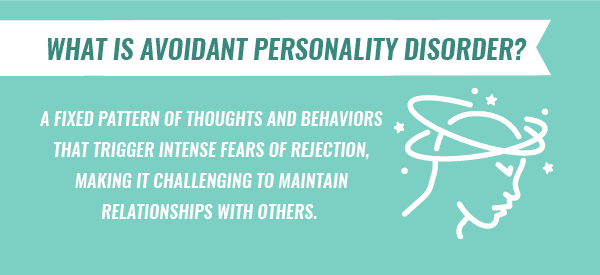
Symptoms of Avoidant Personality Disorder
Avoidant personality disorder symptomstypically include:
Treatment Can Be Life Changing. Reach out today.
Whether you are struggling with addiction, mental health or both, our expert team is here to guide you every step of the way. Don’t wait— reach out today to take the first step toward taking control of your life.
- Avoidance of academic, social or occupational functions
- Low self-confidence
- Self-isolating behaviors
- Feeling unwanted or undesirable
- Evading activities for fear of rejection
- Seeing oneself as substandard
- Low tolerance for negative feedback
- Blushing, stuttering or remaining silent in conversations
- Spending time trying to read others for signs of praise or dismissal
A person with avoidant personality disorder displays awareness that they are uneasy in social situations, but often maintains inaccurate perceptions of others. Because of their severe symptoms, a person with this disorder usually has very few close friendships or intimate relationships.
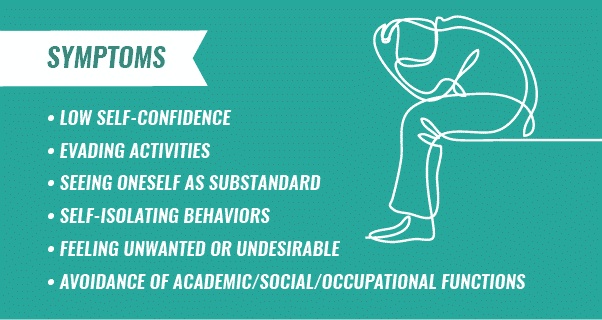
Causes of Avoidant Personality Disorder
Currently, the causes ofavoidant personality disorderare unknown, but it is believed that biological, psychological and environmental factors all play an important role. Genetics and psychological factors including personality and temperament can be potential contributors. Social factors, such as interactions and experiences during early childhood and learned coping mechanisms might also contribute to the development of this condition.
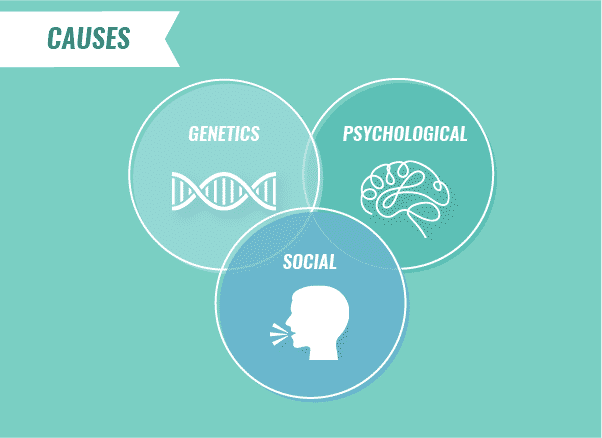
Diagnosing Avoidant Personality Disorder
A mental health professional can conduct anavoidant personality disorder testduring a psychiatric evaluation, according to the criteria listed in the Diagnostic and Statistical Manual of Mental Disorders, fifth edition (DSM-5).
A person must meet at least four of the following seven criteria to obtain an avoidant personality disorder diagnosis.
- The avoidance of work-related activities involving considerable social contact due to fears of negative response or comments.
- The reluctance to engage in any relationship unless they are positive that they will be liked and well-received.
- Limits participation in an intimate relationship due to fear of being embarrassed or teased.
- Shows preoccupation with being critiqued or dismissed in social situations.
- Is withdrawn and subdued in new social situations due to feelings of insufficiency.
- Has low self-confidence and feels socially incompetent and substandard to others.
- Displays unwillingness to participate in new activities for fear of being embarrassed.
It is also important to notes that avoidant personality disorder cannot be diagnosed in childhood. Being withdrawn, socially awkward or vulnerable to criticism are usually part of normal childhood development. To receive a diagnosis, a person must display these criteria during early adulthood.
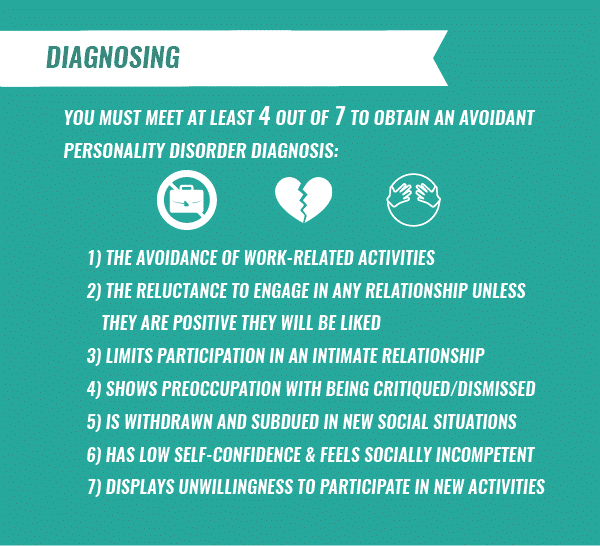
Who Is at Risk for Avoidant Personality Disorder?
Avoidant personality disorder risk factorsmay stem from early childhood experiences. Children who view caregivers as rejecting and uncaring may be at increased risk for developing avoidant personality disorder. Children who have experienced forms ofabuse, neglect or traumaalso show elevated risk for developing avoidant personality disorder.
Another risk factor can be an alteration in appearance as a result of a physical illness. These experiences may lead to the avoidance of socialization opportunities as a coping mechanism.
Avoidant Personality Disorder Statistics
Research is still emerging on the prevalence of avoidant personality disorder in America. Current statistics state that:
- Approximately2.5 percentof the population meet the eligibility requirements for an avoidant personality disorder diagnosis
- Among people in outpatient psychiatric treatment, the rate of avoidant personality disorder cases is approximately3.6 percent
- Onestudy of young adultsrevealed that approximately 1.4 percent of male participants and 2.5 percent of female participants have avoidant personality disorder
- While40 percentof the population deals with shyness, avoidant personality disorder symptoms are much more intense than regular feelings of shyness
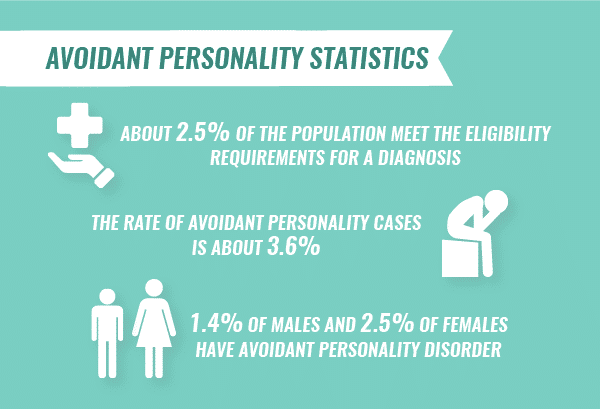
Avoidant Personality Disorder and Substance Abuse
A link exists betweenavoidant personality disorder and substance abuse. Individuals may turn todrugs and alcoholto cope withanxietyand distress related to their disorder. Avoidant personality disorder is often coupled with feelings of humiliation and isolation, which can lead todepressionandsuicidal thoughtsor attempts.
Though people may attempt to manage distressing thoughts and feelings by using alcohol or drugs, unfortunately, using substances only serves to worsen their symptoms, as remorse and shame only intensify the anxiety of being judged or rejected by other people.
Avoidant Personality Disorder Treatment
Many people with personality disorders do not seek treatment until it begins to interfere with daily functioning significantly. An individual with avoidant personality disorder may show some ability to relate to others, butavoidant personality disorder treatmentcan help them enhance their social skills and abilities.
A person may seek treatment to improve their ability to form relationships and to decrease distress. If a person with avoidant personality disorder rejects treatment, they often become isolated and may go on to develop a secondary condition, ordual diagnosis, such as depression orsubstance abuse.
Treating personality disorders can be extremely challenging, as symptoms have usually been present for an extended period.Avoidant personality disorder treatmentgenerally consists of a combination of psychotherapy and medication.Cognitive-behavioraltreatment methods may be particularly successful as they help people change thought patterns and build social skills.Individual, groupand family therapy modalities can help, too.
Medication may be used to treat avoidant personality disorder, especially if a co-occurring condition such as depression or anxiety is present.Antidepressantsandanti-anxiety medicationsare most commonly used in conjunction with this disorder. These medications can also help a person reduce sensitivity to negative responses. It is believed that a combination of psychotherapy and medication is the most effective form of treatment.
If you have a drug or alcohol addiction and a co-occurring personality disorder, help is available. The Recovery Village offers comprehensive substance abuse treatment and mental health care that can empower you to heal physically and emotionally.Call todayto speak with a caring representative and learn more about treatment.








